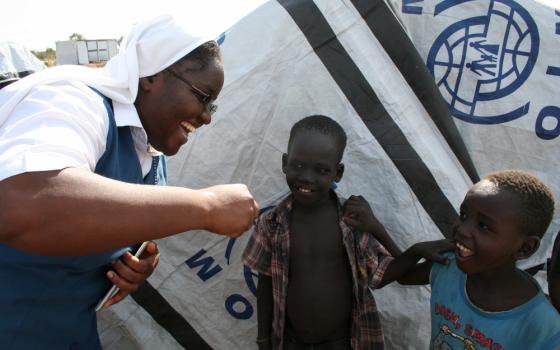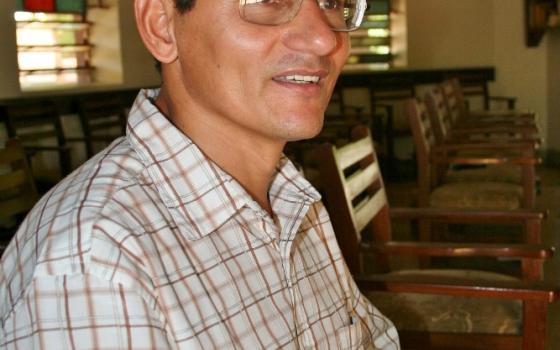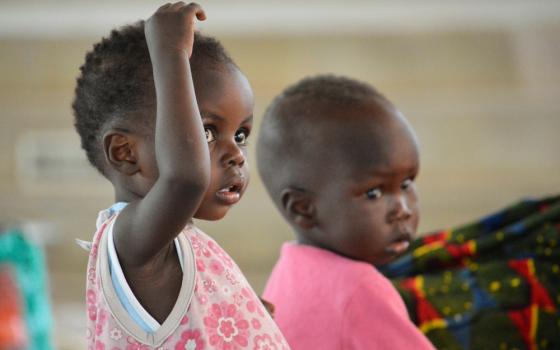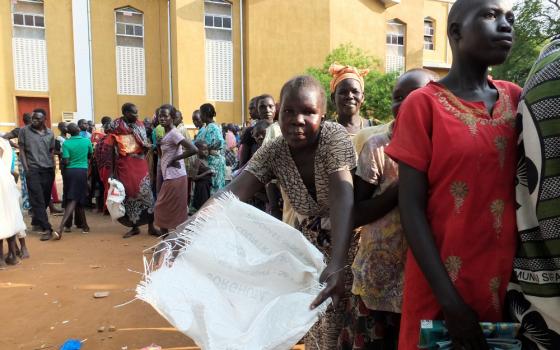A ceasefire called Monday in South Sudan, the site of bloody clashes this past week between troops of opposing political factions, appeared to be holding as of Friday, July 15, but the peace is uneasy at best. The latest crisis for the world's newest country has left hundreds dead and tens of thousands displaced.
The Catholic church is doing its best to offer assistance and protection for those fleeing violence but is hampered by limited resources, said Paulino Lukudu Loro, the archbishop of Juba, the country's capital and site of most of the violence.
Loro told Vatican Radio earlier this week that the overall humanitarian situation in Juba was grim and desperate. "This is the moment, for anyone that can, to step in and save lives," he said.
There has long been tension between forces loyal to President Salva Kiir and First Vice-President Riek Machar. But even the two leaders and political opponents, appearing together July 8 at a news conference in Juba, seemed to be at a loss to explain why the violence was occurring.
Reached by email, women religious and clergy either currently in South Sudan or who recently left painted a picture of a country that descended into a grim cycle of violence as South Sudan marked its fifth anniversary of independence from neighboring Sudan.
In a message July 15, Fr. Raimundo Nonato Rocha dos Santos, a Brazilian Comboni missionary based in the capital city, said, "Juba woke up calm . . . and the cease fire seems to be holding. No more gunfire is heard in town and tensions are subsiding. People feel free to move around town, though the streets are not crowded."
Rocha said life in the city was not back to normal: "Schools remain closed, [there are] reduced bus services, many shops are still closed, [there are] some troops deployed in the areas where fighting has taken place."
He said a large number of displaced people were staying in churches and other safe locales.
Still, there are numerous grim signs of war throughout the city.
"The Red Cross has been collecting dead bodies," Rocha said.
Others confirmed that the situation had calmed down in recent days but still seemed far from resolved.
"Today life here is a bit better we are coming out of our hiding places — i.e. under the mattresses," Daughters of St. Paul Sr. Anne Kiragu, who lives and works in Juba, wrote in an email earlier this week. "It's been tough, but the Lord was really present to protect and encourage all of us here in Juba."
She added that the sisters in her order as well as others she works with "are in houses still . . . with very little movement possible."
Kiragu and Rocha both lived through violence in early 2014 that left scores dead and traumatized tens of thousands.
Earlier in the week, Rocha, who had to flee with others in early 2014 from the Malakal diocese in northeastern South Sudan, said "the general situation" was calm after violence broke out last week that left about 40,000 homeless. Some had returned home while others fled to safety in displacement camps run by the United Nations. The camps were overwhelmed with uprooted people during violence in early 2014.
"We continue monitoring the situation," Rocha said, "and praying for peace."
Rocha said he had been out in a popular market area and "a good number of people [were] moving around and doing their shopping. Buyers are excessively paying more for their food."
He added while there have been "no sounds of gunfire or military aircrafts heard," many expatriates were leaving Juba on chartered flights, and border areas were closed for South Sudanese nationals.
One of those who left was Spanish Sr. Anna Sánchez Boira, a member of the Congregation of Missionary Daughters of the Holy Family of Nazareth, now working with the International Union Superiors General, or UISG. She was with Sr. Yudith Pereira, associate executive director of the church-supported coalition Solidarity with South Sudan. Both returned to Rome earlier this week.
Sánchez Boira described the situation as she left the country as a "fragile peace" marked by instability. But earlier, Juba had descended into chaos.
"Since the 8th of July, the shots were more or less common, sometimes even more intensive. Monday afternoon was really hard, the shots were straight, strong, on our doors" with numerous artillery bombardments, she said. "It was not a dream, war had broken out in Juba."
There is much work to do, she said, in a country already in a fragile state of poverty and hunger and with poor infrastructure. The latest clashes, she said, destroyed progress that been painstakingly achieved in recent years by humanitarian groups and others.
"Development and support of many associations were destroyed in minutes," she said.
In the midst of chaos, she said, the church must continue to "raise her voice in the midst of these events — the church continues to work for the reconstruction of this country."
In an interview Thursday, July 14 with GSR, Bill O'Keefe, vice president of Baltimore-based Catholic Relief Services, which has extensive programs in South Sudan, said staff from some areas in the country had been evacuated, though others have remained. A CRS food security program in the northern part of the country was continuing because no violence has been reported there.
"We felt we could continue some work there," O'Keefe said from CRS's Baltimore headquarters.
The ongoing challenge for CRS, other humanitarian organizations and church bodies, including the Catholic church and groups like the South Sudan Council of Churches, is "getting back to the already-difficult challenge of building up the newest country in the world," he said.
As observers both within and outside South Sudan try to pinpoint the cause of the latest round of violence, O'Keefe noted that factional tensions had existed before South Sudan's independence in July 2011. He also cautioned against reading the situation as a feud between "monolithic blocs" of political factions.
Even so, O'Keefe said "continued peaceful dialogue" is necessary at this point. He said it will be necessary for the governments of the region and the United States "to get the parties to the table." He also said U.N. peacekeeping forces "must be bolstered" given the 40,000 people, most in and around the capital of Juba, who had been displaced.
He also said parties on the ground must, under international law, "ensure humanitarian access for the displaced so that we and others can meet the needs of those who have been displaced."
O'Keefe said support for South Sudan should continue, noting that the United States experienced instability in its early days as a nation — and experienced a traumatic civil war less than 100 years after its founding.
One person taking a pessimistic view of the unfolding event was Clémence Pinaud, an expert on South Sudan who teaches international studies at Indiana University.
"Just five years after independence, and less than one year after a peace agreement was signed," she wrote earlier this week, "a phase of a third South Sudanese civil war seems to have begun."
On Sunday, July 10, the United Nations Security Council strongly condemned the outbreak of violence and demanded that Salva Kiir and Reik Machar "do their utmost to control their respective forces," the U.N. News Center reported.
O'Keefe said he thinks, long-term, that South Sudan will escape from the current crisis.
"They will get there, but it will take time," he said, noting that South Sudan had few roads and little infrastructure when it became independent.
His message? "Don't give up on South Sudan."
[Chris Herlinger is GSR's international correspondent. His email address is cherlinger@ncronline.org.]




